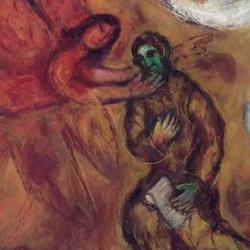INTRODUCTION
From the beginning of Isaiah, the immediate political threat to Judah has been the anti-Assyrian alliance of Israel and Aram (cf. Isaiah 7-8). In the burden concerning Damascus, Isaiah prophesies the collapse of that alliance and judgment on Ephraim who has “forgotten the God of your salvation” (7:10).
THE TEXT
“The burden against Damascus. Behold, Damascus will cease from being a city, and it will be a ruinous heap. The cities of Aroer are forsaken; they will be for flocks which lie down, and no one will make them afraid. The fortress also will cease from Ephraim, the kingdom from Damascus, and the remnant of Syria; they will be as the glory of the children of Israel, says the Lord of hosts . . . .” (Isaiah 17:1-18:7).
FADING GLORY
Unlike the other burdens of Isaiah, this one is directed against a city rather than a nation (17:1). Damascus will be ruined and turned into pasture for sheep (v. 2). But the main focus is on Ephraim, the northern kingdom of Israel, allied with Damascus (v. 3). The collapse of Damascus means that the “glory of Jacob will fade” (v. 4) on the “day” that is coming for Ephraim (vv. 4, 7, 9, 11). The glory of Jacob is symbolized by the produce of Israel’s fields and orchards. It is being harvested and carried off. Yet, Yahweh is a gleaner (vv. 5-6), who will pick up the grain and olives that are left behind. There will be some among Israel who turn from the altars of the Asherim back to the “Holy One of Israel” (vv. 7-8).
HE REBUKES THEM
Yahweh’s dealings with Israel always have reverberations in the wider world, and Isaiah moves from the “day” of Ephraim to the turmoil of the nations. Land and sea often picture Israel and the nations, and here the tumult and rumbling of the sea symbolizes the uproar of many peoples (v. 12). The nations are only chaff and dust before Yahweh’s powerful wind (v. 13), and Yahweh arranges the world so that the plunderer gets plundered. At the center of verses 12-14 is a declaration about Yahweh’s control of the sea of nations (v. 13b). Jesus shows Himself to be King Yahweh in flesh when He rebukes the waters and calms them (Luke 8:24).
HOMAGE TO YAHWEH
There is a specific political background to the description of bustling international diplomacy in 18:1-2. An Ethiopian (Cushite) king conquered Egypt and sent promises of help to all the nations of Palestine that would join an anti-Assyrian alliance. It was a renewal of the project of Aram and Israel, the project whose defeat Isaiah has already predicted. Commissioning “swift angels” from one nation to another, seeking security through alliances, is futile. Instead, the nations should look to Yahweh to settle things among the nations (18:3-4). As soon as the diplomatic plans begin to bring a harvest, Yahweh will nip off the blossoms with a pruning knife and cut down the branches (v. 5). He will leave them for the wild animals and birds (v. 6). The real international order doesn’t come from alliances, diplomacy, politicking. Peace among nations will come when gifts of homage are brought to Yahweh from peoples far and wide (v. 7). Nations will be at peace when they all join in worship of the living God. In short, what Yahweh did in the case of Israel and Aram exemplifies His wider plan for the nations: He frustrates proud and idolatrous politics in order to establish His own politics and His own polity.










